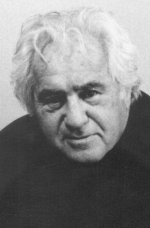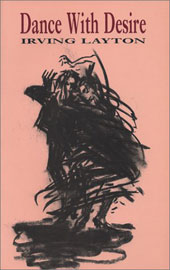The Porcupine's Quill
Celebrating forty years on the Main Street
of Erin Village, Wellington County
BOOKS IN PRINT
Dance With Desire by Irving Layton
‘Don’t let the title fool you; this is not a book of romantic bric-a-brac, a Valentine’s Day gift to be lightly given and lightly forgotten. Irving Layton’s career was based on an unflinching attention to everything he could discover about the human character, including its less savoury aspects. In the poems of Dance with Desire chosen from across the span of his long career, Layton styles himself as a 20th-century Catullus, loving and hating with equal glee, given to passionate excesses and epigrammatic precision, utterly unconcerned with sweet nothings or political correctness. Layton is often charged with being too verbose, with having published far too many substandard poems, and having let his verse grow slack as he grew older. These are all valid criticisms, but they don’t really apply to Dance with Desire since its very existence depends upon the excesses, embarrassments, and foolishness of the unstifled love that Layton celebrates.’
Author comments
William Wordsworth was turned on by daffodils; I’m turned on by women. He saw their golden cups tossing beside the lake and stored the sight away in his mind to give him a lift whenever he felt vacant or depressed. I treasure the sight of firm-titted women walking on Avenue Road or St. Catherine Street. He didn’t pluck every daffodil he celebrated, nor have I every woman I’ve written poems for and now lay gratefully between the covers of this book.
My first poem was to a Grade Six teacher, Miss Benjamin. I yearned for her as only a horny pre-adolescent can who doesn’t know what to do with his impulses, a riot of romanticism, idealism and burgeoning sensuality. I can still recall the excitement ‘in the blood’ I felt each time she entered the classroom, the dizziness and rapture I experienced when I looked up and saw her dimples, the lovely flush of her cheeks, her wavy brown hair. I used to pretend I had some difficulty with the arithmetic problem she had set the class to get her to bend over my desk so that I might see the crimson tinge that began at her chin and went right down to her tantalizing cleavage. Indeed, it has often occurred to me that every woman I’ve ever loved has been a materialization of Miss Benjamin, the fleshly incarnation of my boyhood desire for her.
Everything poets write about when they describe the delirium and ecstasy of love I have known from that time on. It has been difficult, sometimes impossible to give my attention to anything else; difficult for my mind with its penchant for abstractions and concepts to trick my heart into paying them the slightest heed or consideration. How can anyone who has known the intensities of love, its sudden spirallings upward to glory or downward to disaster and grief seriously entertain for any length of time notions on politics, religion, philosophy, literature, or even the meaner appetites and ambitions prevalent upon this planet. ‘The food of love’ is the only kind I’ve ever cared to eat, the only food I’ve ever hungered for. And talking about food: didn’t I bolt down tiny black pellets of goat dung because I didn’t want my first love, watching me pick them up in her backyard, to think that her eleven-year-old gallant couldn’t tell the difference between them and olives? Symbol or omen? Foretaste of things to come? Metaphor for the inescapable paradoxes of love? All these, of course.
I may have written two- or three-hundred love poems since my first one for Miss Benjamin. Many of them with more propriety could be called hate poems, for surely love and hate are two sides of the coin we call sexual interest or desire. For the present collection I’ve tried to cull those poems that when put together in one volume will give the reader the startling thrill of a déjà vu. I want him to exclaim with understanding, amusement and sympathy: ‘Yes, the writer of these verses knows what he’s talking about. He has really been there, on those scarred slopes inhabited by ‘‘La Belle Dame Sans Merci’’. He has paid for them in agony and exaltation for they have the authentic feel only personal knowledge can confer, without which poems are as lifeless as a pickled fetus. Only someone who has been on those slopes can have reproduced so faithfully the glory and carnage of the love emotion.’
What is the love emotion? When you are lost and most yourself. Or to be comical and light-hearted about the matter: when you are a Sufi with Sophie on the sofa and you feel most alive, most intensely yourself and most generous.
When the antinomies of existence dissolve and dance into one another, merging into a music one hears at no other time; when clapping your hands with them as they melt into oneness you behold in a moment of ecstatic vision the seamless unity of creation. At that moment dictator and tyrant are worms’ food and you know with luminous certainty that all who hanker after titles and money are sick unhappy cripples the world would do beautifully without.
Let the philosophers rave on about the summum bonum and mystics about embracing God. They are still vertical humans and therefore even their adorations still have something aggressive about them. Humans in the horizontal position have always struck me as less likely to be violent and destructive. So I take my place beside the poets, and less arrogant than the philosopher or mystic, am prepared to find the greatest good and embrace God whenever I hold a woman in the act of love. It is then I know with assurance and inexpressible delight that whatever it is life promises us, this must be it; and that a universe containing this experience must have something grandly important going for it. That is, finally, when all the subtractions are made, what the love poems in this book are all about.
—Irving Layton
Unpublished endorsement
‘Reading through these poems took me back to the spirit of the 50s and the 60s. As a young artist on the scene, I heard Layton giving readings at the Bohemian Embassy and other coffeehouses in Toronto and Montreal. Reading some of the poems was like a reunion with old friends, although I had no trouble connecting with those I had never read before. I produced close to a hundred drawings, some of which were used as working drawings for the six prints accompanying the deluxe edition (of Dance With Desire). Themes range from the personal to the universal. Appropriately, they read like a beautiful poem.’
—Richard Gorman
Irving Layton (Israel Lazarovitch) was born March 12, 1912 in Tirgu Neamt, Romania. Layton came to Montreal with his family before he was one. He attained a BSc in agriculture at Macdonald College in 1939. Following a stint in the Canadian Army, he did graduate work in political science at McGill. A poet, short-story writer, and essayist, Layton is perhaps the most well-known of the Montreal poets, a group of young poets who engaged in a battle against romanticism in poetry in the 1940’s. Layton has published many poetry collections, including A Red Carpet for the Sun (1959) which won the Governor General’s Award. Layton was poet-in-residence at various Canadian universities and a professor of English at York University 1969-78. He was nominated for the Nobel Prize in 1981.
Irving Layton died in 2006.
The Porcupine's Quill would like to acknowledge the support of the Ontario Arts Council and the Canada Council for the Arts for our publishing program. The financial support of the Government of Canada through the Canada Book Fund (CBF) is also gratefully acknowledged.




